Ex-Met chief Lord Stevens to lead Labour police review
- Published
- comments
Shadow home secretary Yvette Cooper claimed Tony Blair was right on crime, hours after Ed Miliband distanced himself from the former PM
A "heavyweight" independent review of policing in England and Wales is to be set up by Labour and led by former Metropolitan Police chief Lord Stevens.
Shadow home secretary Yvette Cooper said ministers' reforms to the service were "piecemeal" and "cack-handed".
She also told the Labour conference David Cameron was taking a "reckless risk with the fight against crime" by cutting police budgets by 20%.
He "should be backing the police, not sacking them," she said.
The overall structure of the police service was last examined by a royal commission in 1962.
Successive governments have resisted requests by police leaders to set up a new one and Ms Cooper said Labour's review would be in place of it.
US expertise
She told the party's conference in Liverpool that ministers were introducing "chaos and confusion" to the police force.
"They promise less bureaucracy but they increase the forms officers have to fill," she said.
"They promise to professionalise the service, but then abolish the training to deliver it."
She argued that it was time "for a serious vision for the future of policing - building on the best of British and international policing. Including experts from here and abroad."
The review will be led by Lord Stevens, who retired as commissioner of the UK's largest police force in 2005. Since then he has led the Met's inquiry into the death of Diana, Princess of Wales, and the Football Association's investigation into alleged corruption within the sport.
Dr Tim Brain, a former chief constable of Gloucestershire Police, will also be on the panel, along with Kathleen O'Toole, a former police commissioner in the US city of Boston.
Ms Cooper said there was no fixed timetable for the review, but she wanted it to report back before the next general election in 2015.
She stressed that, while Labour would set it up, the review would be independent and her party would respond to its findings.
Derek Barnett, president of the Police Superintendents Association, said he "fully supported" the idea of a review.
"We've discussed and called for it for 10 years," he said. "Never has it been more important to have a review."
Paul McKeever, head of the Police Federation, said it was "a very good idea".
'Political context'
There are two reviews involving the police force currently under way - Tom Winsor's into pay and recruitment, and Lord Justice Leveson's judicial inquiry into phone hacking.
Former deputy chief constable of North Yorkshire police Peter Walker told BBC Radio 4's World at One he did not think Labour's move was the right one at the present time and said policing should "be kept non-political".

Lord Stevens lead the Met Police's inquiry into the death or Diana, Princess of Wales
"This is really just placing the issue of policing in a political context by one political party," he said.
He said the timing was not right for a royal commission, because it would "cut across" the judicial inquiry and it would be better to wait until after the next election, when changes such as the new elected police commissioners would have been in place for three years.
Police forces in England and Wales are facing a 20% reduction in their funding over the next four years, with an estimated reduction in the number of offices of 16,000.
David Cameron has dismissed suggestions that following the recent riots the government should rethink the cuts and told a Commons committee they were "totally achievable without any reduction in visible policing".
But Ms Cooper accused the government of "getting it wrong" on crime and insisted "police numbers do matter".
She told the conference that the £100m earmarked for the introduction of police and crime commissioners in England and Wales should instead be spent on keeping on more than 2,000 extra constables, and suggested some could be spent on anti-gang initiatives.
"David Cameron's claim that the riots are the product of a broken society to me sounds like a form of surrender."
Ms Cooper said the Labour government had made some mistakes - efforts to introduce 90-day pre-trial detention for terror suspects was "never justified by the evidence".
But she said Labour should be proud of its successes, adding: "Tony Blair was right - tough on crime, tough on the causes of crime - because it worked."
Shadow justice minister Sadiq Khan, in his speech to conference, promised that a future Labour government would introduce a victims' law.
He said it would enshrine in statute the rights of bereaved families and ensure they were treated with "dignity and respect" at every stage of the criminal justice process.